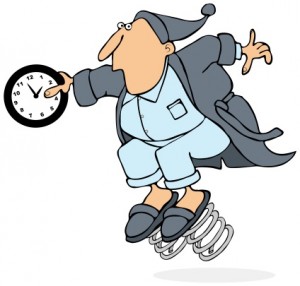Summer vacation is an opportunity for children to extend their bedtimes at night and sleep a little later in the morning. While most parents tend to be a bit more flexible with their kid’s sleeping habits during this time of the year, it’s important to remember that back to school is just around the corner and now is the time to reestablish a proper sleeping routine for your children.
After a relaxing summer, children might need some time to adjust to a regular schedule. Here are some tips to help your child ease into his or her school-time sleep pattern and to maintain healthy sleep habits throughout the year:
- Every night, beginning 1-2 weeks before school begins, set an incrementally earlier bedtime and wake-up time.
- Once your child’s sleep schedule is established, stick with it! Don’t use the weekend to “catch up on sleep.”
- Establish a relaxing bedtime routine to allow your child to unwind including a bath and a bed-time story (for young children) or a reading time (for older children).
- Limit television, video games, and other electronic distractions before and during bedtime.
- Avoid big meals and caffeinated beverages close to bedtime as they may prevent your child from falling asleep.
- Maintain a peaceful bedroom environment which includes a comfy bed, appropriate room temperature and lights turned off, or with a night light if your child needs one.
- Be a role model by setting a good example for your child. Establish your own regular sleep schedulec and maintain a home that promotes healthy sleep.
Getting your child back on track at bedtime will allow for a smooth transition for the first day of school and will help your children reach their full learning potential.
All content of this newsletter is intended for general information purposes only and is not intended or implied to be a substitute for professional medical advice, diagnosis or treatment. Please consult a medical professional before adopting any of the suggestions on this page. You must never disregard professional medical advice or delay seeking medical treatment based upon any content of this newsletter. PROMPTLY CONSULT YOUR PHYSICIAN OR CALL 911 IF YOU BELIEVE YOU HAVE A MEDICAL EMERGENCY.


 Kleine Levin Syndrome (KLS) or Sleeping Beauty Syndrome is a rare neurological condition characterized by recurring periods of excess sleep. It is estimated that 1000 people worldwide are diagnosed with the disorder. Adolescent boys are primarily affected but a small percentage of adults and small children (male and female) are also known to suffer from this condition.
Kleine Levin Syndrome (KLS) or Sleeping Beauty Syndrome is a rare neurological condition characterized by recurring periods of excess sleep. It is estimated that 1000 people worldwide are diagnosed with the disorder. Adolescent boys are primarily affected but a small percentage of adults and small children (male and female) are also known to suffer from this condition.

